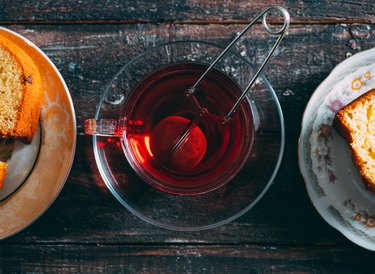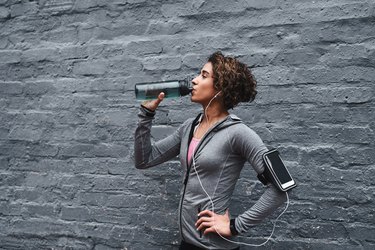
The benefits of drinking tea versus drinking water may surprise you: Tea can quench your thirst and hydrate you.
Daily fluid intake sources can include water, juice, coffee and yes, tea, according to the National Library of Medicine (NLM). But tea may provide additional health benefits than plain water or sugary sodas.
Video of the Day
Video of the Day
Water Intake Guidelines
To fully understand the effects of tea on hydration, it helps to dig into how much fluid you really need.
Your body needs adequate fluid to function. This is true of every part of your body, from your cells to your organs. Getting adequate fluid helps you feel energized, protects your tissues and helps lubricate your joints.
You may have heard that drinking eight glasses of water is ideal to keep you hydrated, but this is not necessarily the full truth. But hydration is a factor of total fluid intake, not just total water intake. You get fluids from other beverages, like milk and soda, liquid-based foods like soup and even water-rich fruits and veggies like watermelon and cucumbers, according to the NLM.
Adults should aim for 91 to 125 fluid ounces of water a day, per the NLM. That's equivalent to 2.7 to 3.7 liters or about 11 to 16 cups, but your personal water needs can vary from day to day and will change with your age, weight, how much you exercise and the environment in which you live. Other factors that can affect your fluid needs can include medical conditions or medications you take.
Tea vs. Water for Hydration
Water is a vital nutrient for your body, but you don't necessarily have to drink plain water to take advantage of those benefits. About 20 percent of your daily fluid needs come from food, according to the Mayo Clinic. The rest can come from other drinks, which can include hot or cold teas.
Black and green teas contain caffeine, while water doesn't have any caffeine. Caffeine has often been considered a diuretic, so it's natural to wonder about caffeine and hydration side effects. But preliminary research suggests there's little, if any, difference in hydration status between drinking black tea and drinking water, according to a small March 2011 study in The British Journal of Nutrition.
Other research suggests caffeine doesn't become a diuretic until you take in about 500 milligrams daily, according to January 2014 research in PLOS One. Black and green teas usually contain around 30 to 50 milligrams per 8 ounces, according to the FDA, so you'd really have to drink a lot of tea for it to hurt your hydration levels.
Herbal teas don't have any caffeine and are essentially equivalent to water in terms of hydration.
What About Coffee?
There's more caffeine in coffee — usually about 80 to 100 milligrams in 8 ounces, per the FDA — so you could get to that 500-milligram cutoff more quickly. But as long as you're sticking to 4 cups of coffee a day (or fewer!), coffee can also count toward water intake.
Watch Out for Added Sugars
Consider how you prepare your tea. One advantage of drinking pure water is that it contains no refined sugars, fats or calories. What you add to your tea can affect your health.
One of the biggest sources of added sugar is from sweetened tea, according to the American Heart Association (AHA). Added sugar can contribute to heart problems, obesity and other health concerns.
Try to drink your tea with no sweetener if you're looking for a healthy beverage for hydration. If you do need a sweetener, opt for a small amount of honey instead of processed sugar. Even though it still counts as added sugar, it's more natural and has its own health benefits.
Other Benefits of Tea
Although you can get hydration benefits from drinking plain water, you can get some extra perks if you drink tea.
For example, drinking black or green tea is linked to better heart health, lower cholesterol and lower blood pressure, according to Harvard Health Publishing. Tea is also associated with benefits for memory, inflammation, longevity and weight loss.
- NLM: "Caffeine in the Diet"
- AHA: "Sugar 101"
- Mayo Clinic: "Water: How Much Should You Drink Every Day?"
- NLM: "Water in diet"
- The British Journal of Nutrition: "Black tea is not significantly different from water in the maintenance of normal hydration in human subjects: results from a randomised controlled trial"
- PLOS One: "No Evidence of Dehydration with Moderate Daily Coffee Intake: A Counterbalanced Cross-Over Study in a Free-Living Population"
- FDA: "Spilling the Beans: How Much Caffeine is Too Much?"
- Harvard Health Publishing: "Regular tea drinking linked to better heart health"
Was this article helpful?
150 Characters Max
0/150
Thank you for sharing!
Thank you for your feedback!


